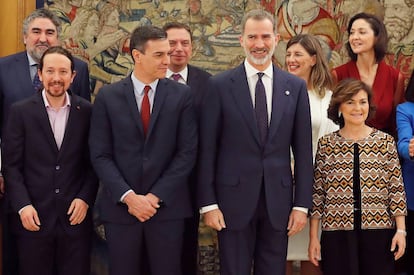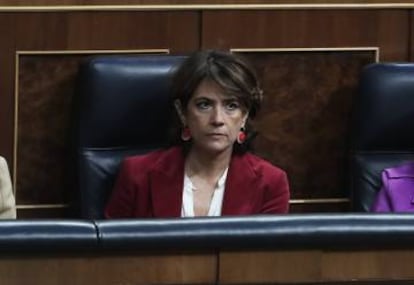Spain’s new Cabinet is sworn in before King Felipe VI
Podemos leader Pablo Iglesias, one of the new deputy prime ministers, called on social movements to “not stop criticizing us, not stop pressuring us” while in power

The four deputy prime ministers and 18 ministers in the new government of Prime Minister Pedro Sánchez were sworn in today before Spain’s King Felipe VI at the Zarzuela Palace. The monarch congratulated the lawmakers and wished them luck. The first Cabinet meeting is due to take place on Tuesday.
PM Sánchez informed the king of the composition of his new government on Sunday, before making an institutional speech during which he said that the administration will have “a solid commitment to unity” and will “walk in one single direction.” He added that the government “will speak with a number of voices, but always with one single word.”
Alberto Garzón of the United Left said he will work his fingers to the bone as the new minister for consumer affairs
The new government is made up of a coalition of Sánchez’s Socialist Party (PSOE) and the leftist Unidas Podemos. A deal between the two groups was struck in the wake of the repeat election on November 10, which, as at the previous polls in April, saw Sánchez take most votes but fall short of a majority. Sánchez was successful at an investiture vote last week after securing the key abstention of the Catalan Republican Left (ERC), a pro-Catalan independence party that has received guarantees of future talks with the central government on the political situation in the northeastern Spanish region in return.
The leader of Unidas Podemos, Pablo Iglesias, has been given one of the deputy prime ministerial roles in the new government, and will look after the portfolio covering social rights and “Agenda 2030,” which deals with sustainable development.
Iglesias gave his first speech as minister today at the Health Ministry, where he will be based. He said that social movements will be “a reference point” for his work in the coalition government. “Don’t stop criticizing us, don’t stop pressuring us,” he said to these groups. Iglesias’s party, Podemos, was born from the so-called 15-M citizen movement that sprung up in 2011, in protest at Spain’s two-party political system (PSOE and the conservative Popular Party (PP)), and to demand greater democratic rights for citizens.

Podemos joined forces with the United Left ahead of the 2019 general elections, and the leader of the latter party, Alberto Garzón, was today sworn in as minister for consumer affairs. The politician promised to “work his fingers to the bone” in the ministry, and said the new government must face the challenge of building a “more fair society,” facing the adversities that exist in a country where, he said, “hatred is spreading.”
A controversial appointment
Meanwhile, there was controversy today among the political opposition in reaction to news that Prime Minister Pedro Sánchez had proposed Dolores Delgado as the new prosecutor general. Delgado was appointed by Sánchez as justice minister in June 2018.
Since Spain returned to democracy in the late 1970s, there has only been one other occasion when a minister has become prosecutor general, and that was back in 1986 under PSOE Prime Minister Felipe González.
Delgado arrived in government as an independent – judges and prosecutors are barred from joining political parties under Spanish law – but in recent months she has consolidated her political role thanks to harsh clashes with the opposition and she has also campaigned for the PSOE. She was voted in as a deputy at the last elections.
In Spain, as in most democratic countries, the prosecutor general is always named by the executive, but operates independently from the government. In the political world the idea that the government controls public prosecutors is firmly entrenched, but in practice this is not always the case. During the Supreme Court trial of the Catalan pro-independence leaders, for example, the public prosecutor’s position was markedly different from that of the solicitor general’s office, which represents the government in such cases.
When news of Delgado’s appointment broke, the leader of the PP, Pablo Casado, said that the move was an attack on Spain’s separation of powers. Marcos de Quinto, a deputy from the center-right Ciudadanos (Citizens) party, said via Twitter that the move was a “scandal,” and decried what he called the “venezuelization of Spain.”
Based on reporting by Carlos E. Cué, Fernando J. Pérez and Inés Santaeulalia. English version by Simon Hunter.
Tu suscripción se está usando en otro dispositivo
¿Quieres añadir otro usuario a tu suscripción?
Si continúas leyendo en este dispositivo, no se podrá leer en el otro.
FlechaTu suscripción se está usando en otro dispositivo y solo puedes acceder a EL PAÍS desde un dispositivo a la vez.
Si quieres compartir tu cuenta, cambia tu suscripción a la modalidad Premium, así podrás añadir otro usuario. Cada uno accederá con su propia cuenta de email, lo que os permitirá personalizar vuestra experiencia en EL PAÍS.
¿Tienes una suscripción de empresa? Accede aquí para contratar más cuentas.
En el caso de no saber quién está usando tu cuenta, te recomendamos cambiar tu contraseña aquí.
Si decides continuar compartiendo tu cuenta, este mensaje se mostrará en tu dispositivo y en el de la otra persona que está usando tu cuenta de forma indefinida, afectando a tu experiencia de lectura. Puedes consultar aquí los términos y condiciones de la suscripción digital.








































